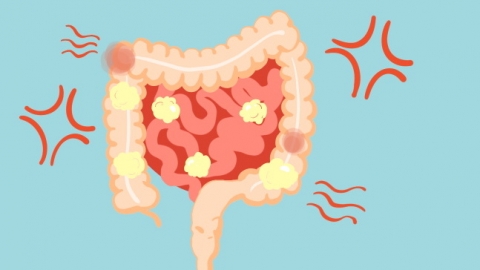How to have a quick bowel movement for constipation
Constipation is usually associated with factors such as a lack of dietary fiber, insufficient physical activity, intestinal flora imbalance, irritable bowel syndrome, and diabetes. Patients can improve the condition through increased vegetable intake, more exercise, and medical treatment. It is recommended to visit a hospital to identify the exact cause and follow medical advice for treatment. Detailed explanations are as follows:

1. Lack of Dietary Fiber: Insufficient dietary fiber is a common cause of constipation. Fiber increases stool bulk and facilitates smooth bowel movements. It is recommended to increase fiber intake by consuming more vegetables, fruits, and whole grains.
2. Insufficient Physical Activity: Prolonged bed rest or sedentary work without adequate exercise can slow intestinal motility, impairing stool passage and causing constipation. Increasing physical activity through walking, jogging, yoga, or other aerobic exercises may help.
3. Intestinal Flora Imbalance: Disruption of intestinal flora can lead to abnormal bowel function, affecting stool formation and excretion, thus causing constipation. Symptoms may include bloating, diarrhea, and indigestion. Patients should follow medical advice to take medications such as Bifidobacterium quadruple viable tablets, Bacillus subtilis and Bifidobacterium lactis enteric-coated capsules, or lactulose oral solution.
4. Irritable Bowel Syndrome (IBS): IBS is a common functional bowel disorder characterized by recurrent abdominal pain, bloating, alternating constipation and diarrhea, increased gas, and emotional fluctuations. Patients should follow doctors' recommendations to use medications such as pinaverium bromide tablets, racemic scopolamine butylbromide tablets, or montmorillonite powder to aid recovery.
5. Diabetes: Hyperglycemia can damage nerves, impair intestinal motility, prolong the retention time of food residue in the intestines, and cause constipation. Symptoms may also include frequent urination, weight loss, and fatigue. Patients are advised to take medications such as metformin hydrochloride tablets, repaglinide tablets, or glipizide tablets under medical guidance to alleviate symptoms.
In daily life, it is important to establish regular exercise habits, such as walking, jogging, and yoga, while ensuring adequate hydration to promote intestinal motility.







